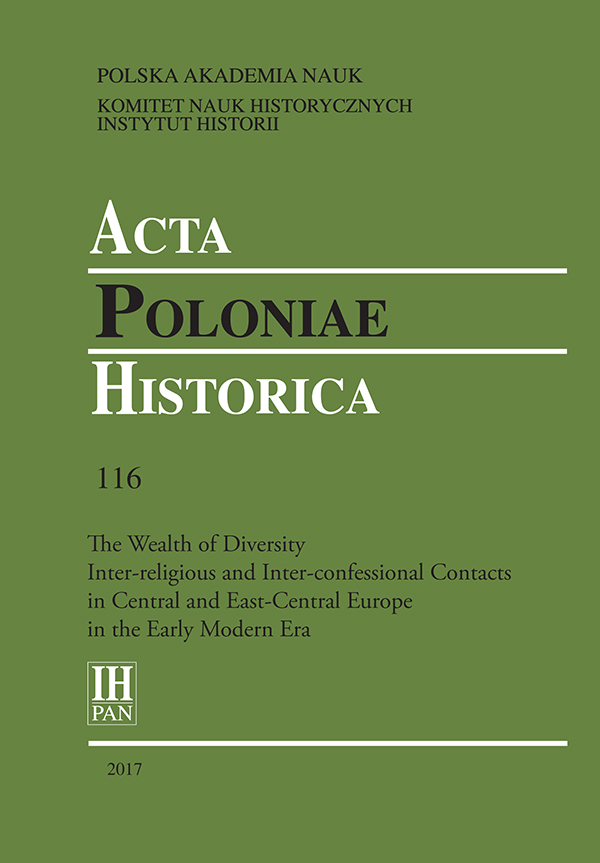Between Mercantilism, Oriental Luxury and the Ottoman Threat: Discourses on the Armenian Diaspora in the Early Modern Kingdom of Poland
DOI:
https://doi.org/10.12775/APH.2017.116.07Schlagworte
mercantilism, luxury, the Ottoman threat, trading Diaspora, ArmeniansAbstract
This paper analyses the attitudes toward the Armenian Diaspora in early modern Polish society through a close examination of the issues viewed as burning by the contemporaries. The paper is focused on three such burning topics – a) the ‘price revolution’ and, in connection therewith, mercantilism; b) the growing level of consumption (“redundant luxury” – zbytek nierozmyślny) and the fears of social disorder aroused by it; and c) the Ottoman threat (real and imagined). The paper argues that there were a variety of discourses on the Armenians because the discourses were influenced by the different answers to the challenging issues presented by the representatives of various social estates – noblemen (szlachta), clergymen (duchowieństwo) and burghers (mieszczaństwo). Therefore, the attitudes to the Monophysite Armenians in Polish society were mostly shaped not as part of the Counter-Reformation agenda (as was the case with respect to Protestants and the GreekOrthodox), but rather within the framework of economic (mercantilism), social (consumption), and psychological/political (fears of the Ottoman threat) issues.Literaturhinweise
Biedrońska-Słota Beata, Ormianie polscy: odrębność i asymilacja (Kraków, 1999).
Dziubiński Andrzej, Na szlakach Orientu. Handel między Polską a Imperium Osmańskim w XVI–XVII wieku (Wrocław, 1997).
Goffman Daniel, The Ottoman Empire and Early Modern Europe (Cambridge, 2004).
Grygorjeva Tetjana, ‘Symbols and Perceptions of Diplomatic Ceremony: Ambassadors of the Polish-Lithuanian Commonwealth in Istanbul’, in Yvonne Kleinmann (ed.), Kommunikation durch symbolische Akte. Religiöse Heterogenität und politische Herrschaft in Polen-Litauen (Stuttgart, 2010).
Jasieński Adam, ‘A Savage Magnificence: Ottomanizing Fashion and the Politics of Display in Early Modern East-Central Europe’, Muqarnas: Middle East and Islamic Studies, xxxi, 1 (2014), 173–205.
Kołodziejczyk Dariusz, Ottoman-Polish Diplomatic Relations (15th–18th Century): An Annotated Edition of ‘Ahdnames and Other Documents (Leiden, 2000).
Kołodziejczyk Dariusz, ‘Slave hunting and slave redemption as a business enterprise: the northern Black Sea region in the sixteenth to seventeenth centuries’, Oriente Moderno, s.n, xxv, 1 (2006): The Ottomans and Trade, 149–59.
Rudolph Harriet, ‘The Material Culture of Diplomacy. The Impact of Objects on the Dynamics of Habsburg-Ottoman Negotiations at the Sublime Porte (1530–1650)’, in Gunda Barth-Scalmani and Christian Steppan (eds.), Politische Kommunikation zwischen Imperien. Der diplomatische Aktionsraum Südostund Osteuropa (Innsbruck, 2013), 211–37.
Stopka Krzysztof, ‘The Religious Culture of Polish Armenians (Church-Public Structures and Relations)’, Acta Poloniae Historica, 101 (2010), 163–205.
Świtalski Zbigniew, ‘Cło od pieniędzy wywożonych za granicę Rzeczypospolitej w latach 1598–1659’, Przegląd Historyczny, li, 1 (1960), 24–32.
Wyrobisz Andrzej, ‘Attitude of the Polish Nobility towards Towns in the First Half of the 17th Century’, Acta Poloniae Historica, 48 (1983), 77–94.
Zakrzewska-Dubasowa Mirosława, Ormianie Zamojscy i ich rola w wymianie handlowej i kulturalnej między Polską a Wschodem (Lublin, 1965).
Zakrzewska-Dubasowa Mirosława, ‘Polityka handlowa Jana Zamoyskiego i jego następców’, Annales Universitatis Mariae Curie-Skłodowska. Sectio F: Historia, xxxviii/xxxix (1983/1984), 93–114.
Żygulski Zdzisław, ‘Armenians in Poland. A Foreign Culture Incorporated’, in Beata Biedrońska-Słota, Magdalena Ginter-Frołow and Jerzy Malinowski (eds.), The Art of the Islamic World and the Artistic Relationships Between Poland and Islamic Countries (Kraków, 2011), 317–36.
Downloads
Veröffentlicht
Zitationsvorschlag
Ausgabe
Rubrik
Lizenz
Title, logo and layout of journal are reserved trademarks of APH.Stats
Number of views and downloads: 563
Number of citations: 3



